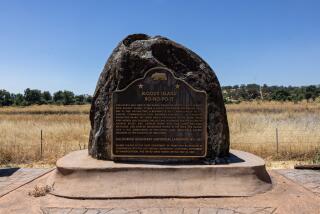When It Comes to Names, Missouri’s the ‘Tickle Me’ State
- Share via
BRAGGADOCIO, Mo. — The town name begs the question: Are folks from Braggadocio braggarts?
“Naw, we’re pretty humble down in these parts, and I know because I’ve lived here all my life,” said Caleb Davis, a 59-year-old farmer. “It is a memorable name for a town, though.”
Missouri has some of the most memorable place names in the United States, from Economy to Tightwad, Romance to Bachelor, Sunrise to Sunset.
“Much can be learned about men and places from their names,” Robert L. Ramsay, the late University of Missouri professor, wrote half a century ago in his book, “Our Storehouse of Missouri Place Names.”
“Names are fossil history,” Ramsay wrote, likening the search for the story behind a place name to an archeological dig. “So the student of language can find in the place names of the state equally priceless relics that are sometimes quite as old, and often even more revealing.”
Ramsay noted that Missourians could take a world tour without leaving the state, just by reading exotic-sounding city limit signs: Mexico, Cuba, Brazil, Belfast, Dublin, Elba, Versailles, Vichy, Lisbon, Milan, Rome and Venice, to cover just part of the Show-Me State’s globe.
There are tributes to natural and mineral wealth, communities called Acid, Galena, Hematite and Crystal City.
Some names were drawn from the classics: Alexandria, Athens, Carthage, Hannibal, Ionia and Eolia.
And some names are just silly: Arp, Ink, Ogg and Tea.
The names behind those signs that rush past so quickly along the highway shoulders reflect the culture, education, experiences and prejudices of Missouri’s settlers.
Even the types of words applied to communities evolve over the decades. For example, biblical names were as popular for places as for babies in the 1800s. But nowadays, there is a tendency to name new settlements -- or subdivisions -- in cozy-sounding tributes to famous golf courses.
“With the current naming practices, be it towns or subdivisions or streets, Scottish, English, Irish and maybe French-sounding names are in vogue. These tend to be unimaginative stock names, usually more trendy than interesting,” said Walter Schroeder, a retired geography professor and chairman of a state commission that is responsible for approving new place names for the sake of consistency.
Braggadocio, an unincorporated community deep in southeast Missouri’s Bootheel, is a fine example of an imaginative name that conjures an image of boastful inhabitants.
Davis said he was always told that the hamlet’s settlers wanted to pick the longest, most impressive name they could find when applying to establish a post office.
With 11 letters, they figured Braggadocio “would really impress the folks up in Washington,” he said with a chuckle.
Ramsay had another take on Braggadocio:
“All records of the exact circumstances of its naming seem to have been lost, and many stories have been invented as for example about the first settler’s having been given to much boasting about the beauty of his wife, who had the remarkable name of ‘Docio’ -- in other words, bragging on Docio.”
The U.S. Post Office finally sent word to new settlements to keep their names short. Thus a raft of three-letter names, from Odd to Ink.
Sometimes the spinning of contemporary explanations for ancient names causes grief for writers and researchers. Schroeder recalled an article he wrote mentioning a Texas County settlement with a one-room schoolhouse known locally as Three John School.
“Someone told me that was because its outhouse had three holes in it, which would have been unusual,” Schroeder said. “But then I received a very sincere but indignant letter from a lady there who said it was named for the board that ran the school, three men all named John. Yes, it’s a more accurate story. Just not quite so funny.”
Peculiar, Mo., near Kansas City, has one of the most-giggled-about names for any town. Schroeder said the founders were asked to provide a name peculiar to the region that wouldn’t duplicate another name.
“They had their first selection rejected, so they came back with Peculiar,” Schroeder said.
In all his travels, Schroeder is most amused about an area in far northern Missouri known for its waterway: No Creek.
“Of course, there is a creek there, and a bridge runs over it. I have asked the locals, is there no creek at No Creek? They really don’t think it’s funny at all. They say they don’t know and don’t care. But there’s obviously some history behind it, so somebody cared.”
*
(BEGIN TEXT OF INFOBOX / INFOGRAPHIC)
Say What, Missouri
A sampling of unusual Missouri place names gathered over the
decades by researchers who note that some of the places no longer appear on maps -- at least not by these names:
Who’d-a-Thought-It (Pemiscot County), 1904
Pucky-Huddle (Crawford County)
Slingtown (Warren County)
Whoop-Up, later known as Sapp (Boone County)
Ink (Shannon County), 1886
Gunboat (Warren County)
King Bee (Ripley County), 1895
Aromatic Creek, also known as Stinking Creek (Clark County)
Buzzard’s Roost (Franklin County), 1852
Economy (Macon County), 1837
Fairplay (Miller County), 1860
Clever (Christian County), 1893
Hardscrabble (Bates County)
Lickskillet (Cass County), 1840
Licking (Texas County)
Smackout (Boone County)
Tightwad (Henry County)
Source: “Our Storehouse of Missouri Place Names,” by Robert L. Ramsay;
first published in 1952 by University of Missouri Press, Columbia
More to Read
Sign up for The Wild
We’ll help you find the best places to hike, bike and run, as well as the perfect silent spots for meditation and yoga.
You may occasionally receive promotional content from the Los Angeles Times.






